C-MEd Forum
- Agenda
- Speakers
- Hotel & Travel
- Sessions
- C-MEd Presentations
Learn from UC San Diego experts in empathy and compassion, as they offer insights on novel medical education and healthcare programming that can be thoughtfully and systematically integrated into your school of medicine or teaching hospital.
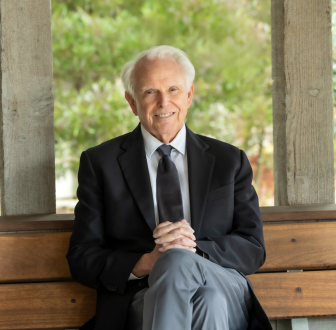
William Mobley is associate dean of neurosciences initiatives and a Distinguished Professor of Neurosciences at UC San Diego School of Medicine. He serves as executive director of UC San Diego's Down Syndrome Center for Research and Treatment and holds the Florence Riford Chair of Alzheimer’s Disease Research. He came to UC San Diego in 2009 from Stanford University, where he served as the John E. Cahill Family Professor in the Department of Neurology and Neurological Sciences and was founding director of the Neuroscience Institute. Mobley’s research is focused on degenerative diseases of the central nervous system, especially Down syndrome and Alzheimer’s disease. He and his colleagues have for many years explored the hypothesis that deficient axonal transport of neurotrophic factor signals contribute importantly to the pathogenesis of neurodegeneration.
Mobley is past president of the Association of University Professors of Neurology; the Professors of Child Neurology and the International Society for Developmental Neuroscience. He is a Fellow of the Royal College of Physicians and the American Association for the Advancement of Science. He is a member of the National Academy of Medicine. He received both the Zenith Award and Temple Award from the Alzheimer's Association and the Cotzias Award from the American Academy of Neurology. In 2007, he received the Christian Pueschel Memorial Research Award, and in 2011 was honored with the International Sisley-Jérôme Lejeune Prize by the Jérôme Lejeune Foundation for his research contributions to Down syndrome and genetic intellectual disabilities. He was inducted into the Johns Hopkins University Society of Scholars in 2014. He currently serves as chair of the Science and Clinical Advisory Committee of the National Down Syndrome Society.

William Mobley is associate dean of neurosciences initiatives and a Distinguished Professor of Neurosciences at UC San Diego School of Medicine. He serves as executive director of UC San Diego's Down Syndrome Center for Research and Treatment and holds the Florence Riford Chair of Alzheimer’s Disease Research. He came to UC San Diego in 2009 from Stanford University, where he served as the John E. Cahill Family Professor in the Department of Neurology and Neurological Sciences and was founding director of the Neuroscience Institute. Mobley’s research is focused on degenerative diseases of the central nervous system, especially Down syndrome and Alzheimer’s disease. He and his colleagues have for many years explored the hypothesis that deficient axonal transport of neurotrophic factor signals contribute importantly to the pathogenesis of neurodegeneration.
Mobley is past president of the Association of University Professors of Neurology; the Professors of Child Neurology and the International Society for Developmental Neuroscience. He is a Fellow of the Royal College of Physicians and the American Association for the Advancement of Science. He is a member of the National Academy of Medicine. He received both the Zenith Award and Temple Award from the Alzheimer's Association and the Cotzias Award from the American Academy of Neurology. In 2007, he received the Christian Pueschel Memorial Research Award, and in 2011 was honored with the International Sisley-Jérôme Lejeune Prize by the Jérôme Lejeune Foundation for his research contributions to Down syndrome and genetic intellectual disabilities. He was inducted into the Johns Hopkins University Society of Scholars in 2014. He currently serves as chair of the Science and Clinical Advisory Committee of the National Down Syndrome Society.
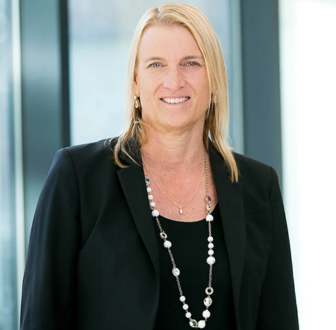
Patty Maysent is chief executive officer of UC San Diego Health, the region's only academic health system, comprising UC San Diego Medical Center, Jacobs Medical Center, Sulpizio Cardiovascular Center, Moores Cancer Center, Shiley Eye Institute, Koman Family Outpatient Pavilion, and more than 30 primary and specialty clinics throughout Southern California. She oversees $3.6 billion in annual operating revenues and leads more than 14,000 team members, who deliver world-class care to more than 1 million patients annually.
Maysent’s commitment to providing the highest quality health care throughout our region has resulted in UC San Diego Health being named #1 in San Diego and #5 in California by U.S. News & World Report. UC San Diego Health was named one of the top 10 academic medical centers for patient care by Vizient, Inc. and maintains Magnet status from the American Nurses Credentialing Center for nursing excellence. The Joint Commission and the Centers for Medicare and Medicaid also bestowed recognition for providing high-quality hospital care. And the Leapfrog Group gave an “A” rating to both the La Jolla and Hillcrest hospitals for safety and quality of care, and citied the Hillcrest facility as a top teaching hospital.
Maysent’s efforts seek to enhance the lives of patients and residents throughout Southern California. She believes everyone deserves the superior care provided by an academic medical center. In 2021, UC San Diego Health provided $599 million in community benefits, including uncompensated and government-sponsored care, charity care and other health services. Foundational work to improve patient care earned UC San Diego Health a perfect score on the Healthcare Equality Index, awarded by the nation’s largest LGBTQ civil rights organization. And Maysent continues to work closely with the San Diego County Board of Supervisors and regional health systems to design a solution for inpatient psychiatric care in the community.
Her leadership has also helped San Diego County prepare for the next public health crisis. She set the bar high for healthcare leaders during the COVID-19 pandemic, which included UC San Diego Health doctors, nurses and staff caring for some of the first patients in the United States diagnosed with COVID-19. UC San Diego Health was a partner, along with thousands of local residents, in three of the four biggest COVID-19 vaccine trials in the nation. And when vaccines were approved, UC San Diego Health, in collaboration with the County of San Diego, City of San Diego and San Diego Padres, opened the state’s first vaccination superstation, dispensing more than 225,000 doses at the Petco Park site in just 68 days — and more than 550,000 overall in less than six months.
Under her guidance, UC San Diego Health has grown significantly with the opening of Jacobs Medical Center and the Koman Family Outpatient Pavilion, both on the La Jolla Medical Campus. Growth and expansion continue with a multi-phase, multi-billion dollar long-range development plan to reimagine the 62-acre UC San Diego Medical Center in Hillcrest. Under construction and scheduled to open in 2025, Phase I includes a state-of-the-art 250,000-square foot outpatient pavilion that will house specialty clinical programs, ambulatory surgery operating rooms, gastroenterology procedure rooms, advanced imaging, and infusion and radiation oncology. The reinvestment expands UC San Diego Health’s legacy of caring for our diverse communities in the heart of San Diego and beyond.
Maysent serves on the board and executive committee of the California Hospital Association. In addition, she is passionate about her years of work with the Boys and Girls Club of San Dieguito, where she has also served on the board and executive committee.
Previously, Maysent served as chief of staff and chief strategy officer at UC San Diego Health. She was CEO of St. Jude Medical Center and served as a consultant for The St. Joseph Health System, University of Southern California's Keck Medical Center and Norris Cancer Center, and Alliance Healthcare Services.
She holds a master's degree in business administration and a master’s degree in public health, both from UCLA, and received a bachelor's degree in human biology from Stanford University.
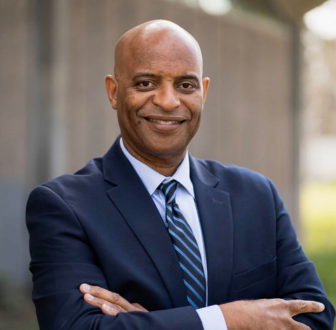
Vice Chancellor for Health Sciences, University of California San Diego
Dr. Carethers, MD became the Vice Chancellor for Health Sciences at UC San Diego in January 2023, overseeing UC San Diego Health along with the School of Medicine, School of Public Health and School of Pharmaceutical Sciences to integrate, grow, and expand the missions of clinical excellence, education, discovery, and community engagement. He obtained his MD from Wayne State, followed by residency in internal medicine at Massachusetts General Hospital and gastroenterology fellowship at the University of Michigan. He served as Chair of the Department of Internal Medicine at the University of Michigan from 2009 through 2022. Dr. Carethers is a trained gastroenterologist and physician-scientist who focuses his research in the area of hereditary colon cancer genetics and colon cancer disparities publishing over 250 manuscripts and book chapters. He has been continuously funded by the NIH for nearly 30 years. His work has focused on DNA mismatch repair function that drives post-replicative repair of DNA. He served as Senior Associate Editor for Gastroenterology, completed a 2-year appointment on the National Commission for Digestive Diseases, and currently serves on the NIDDK Advisory Council. He is the immediate past President of the American Gastroenterological Association, past President of the Association of American Physicians, and is currently on the Board of Directors of AACR. He is a member of the US National Academy of Medicine and the American Academy of Arts and Sciences.
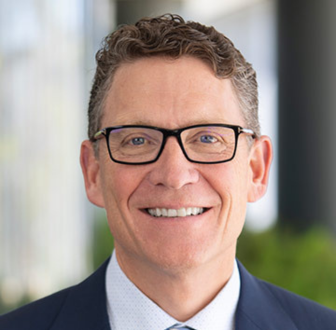
Christopher J. Kane, MD, FACS, Dean of Clinical Affairs; CEO of UC San Diego Health Physician Group;
Professor of Urology at UC San Diego Health. Dr. Kane is on the Executive Governing Board of UC San
Diego Health Sciences and the Executive Committee of UCSD’s Clinical Integration Network. Dr. Kane is
the president of the Western Section AUA and trustee of the American Board of Urology. Dr. Kane is an
internationally recognized expert in prostate cancer and kidney cancer epidemiology, risk stratification
and outcomes after treatment.
Dr. Kane completed his urology residency at Oakland Naval Hospital and UC San Francisco. He earned his medical degree at Uniformed Services University and his BS degree in mechanical engineering at UC
Davis. From 2009 to 2016 he was Co-Chair of the Renal Cell Carcinoma Advisory Task Force, National
Cancer Institute. He is on the AUA guidelines in prostate cancer committee. He was elected to American
Association of GU Surgeons in 2014. In 2017 he was elected to the Clinical Society of Genitourinary
Surgeons. He was selected as a “Top Doctor” in San Diego in 2008-2019 and was selected as one of two
Physician Healthcare Champions for 2010 in San Diego by the San Diego Business Journal. He was
awarded the Distinguished Engineering Alumni Medal by UC Davis in 2011. He is a retired Navy Captain
and a decorated veteran of Desert Storm. Dr. Kane has authored more than 370 publications and book
chapters, primarily on prostate cancer risk factors and outcomes, prostate cancer surgery, and minimally
invasive surgery for prostate and kidney cancer.
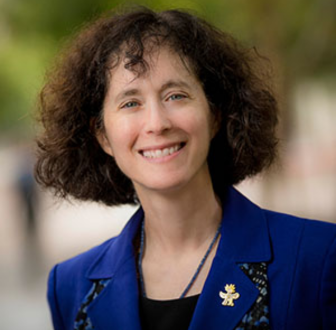
Dr. Elizabeth H. Simmons is the Executive Vice Chancellor at the University of California San Diego. In this capacity, she serves as UC San Diego’s chief academic officer and is responsible for policies and decisions relating to all academic programs and curriculum, instructional support programs, and faculty appointments and performance. She is the institution’s second-ranking executive officer and acts on behalf of the Chancellor in overseeing the University in his absence.
Simmons aspires for UC San Diego to work collectively and coherently in becoming an inclusive student-centered, research-focused, service-oriented university. She envisions that the university will scale up the size, connectivity, and impact of research collaborations; be as proudly innovative in education as in scholarship; and empower every Triton to succeed – undergraduates, graduate students, staff, and faculty.
In her time as Executive Vice Chancellor, Simmons has worked with colleagues in Academic Affairs and partners across all of UC San Diego (and the broader community) to develop overarching strategic goals -- and purposeful habits of collaboration required to make those aspirations attainable and sustainable.
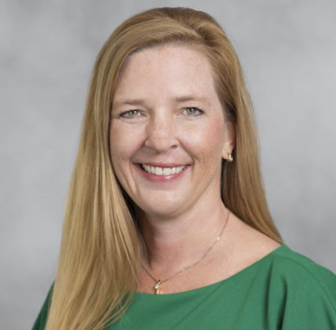
Dr. Michelle Daniel is Vice Dean for Medical Education and Professor of Clinical Emergency Medicine at the University of California, San Diego School of Medicine. She obtained her medical degree from Johns Hopkins Medical School in 2002 and completed her emergency medicine residency at Johns Hopkins Hospital in 2005. She subsequently obtained her Masters in Health Professions Education from Maastricht University in the Netherlands. Prior to coming to UC San Diego, Dr. Daniel served for 6 years as the Curricular Dean for Undergraduate Medical Education at the University of Michigan. She is an internationally known scholar in medical education and well-published in the field. She serves as an Associate Editor for Medical Teacher and Chairs the Best Evidence in Medical Education (BEME) Council. Her scholarly interests include clinical reasoning and theories of cognition, AI in education, systematic reviews, and well-being.
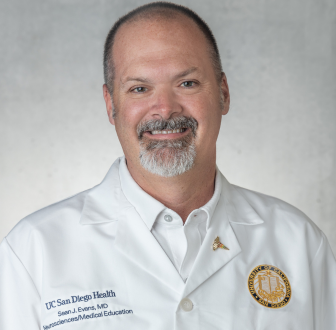
Dr. Sean Evans is a board-certified general clinical neurologist and medical educator with expertise in course design and implementation, examination content creation and assessment, and medical administration. He led UC San Diego's required clinical neurology clerkship for 12 years and co-directed the pre-clerkship level neurology core courses for 10 years. He currently has oversight for the entire UC San Diego School of Medicine curriculum from matriculation to graduation. He has worked with the National Board of Medical Examiners in development and assessment of the United States Medical Licensure Examination for the past 6 years and holds leadership roles in both material creation and assessment committees.
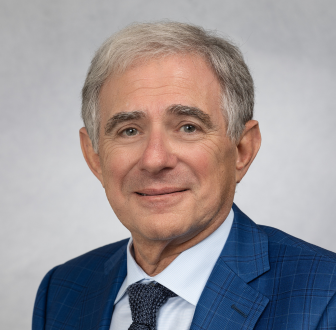
Steven Garfin, MD, is interim dean of the University of California San Diego School of Medicine. In this role, he directs the school's educational mission, including the evolution of its curriculum, and provides oversight for all academic and clinical departments and research units.
He has a leadership role in all School of Medicine councils and collaborates with medical school deans across the five University of California medical campuses.
An internationally recognized leader in orthopedic surgery, Dr. Garfin joined the UC San Diego School of Medicine faculty in 1981 and has served as chair of the Department of Orthopaedic Surgery since 1997. Under his oversight, the department received more than $21 million in annual grant funding and ranked nationally for research output.
Dr. Garfin is well established as a forward-thinking leader, having been involved in designing and
assessing surgical techniques and instrumentation to treat spinal disorders. At UC San Diego Health, he
was the first to articulate the need for a world-class ambulatory building to support Jacobs Medical
Center, a vision that resulted in the opening of the Koman Family Outpatient Pavilion.
In his clinical practice, Dr. Garfin specializes in complex reconstructive spine surgery, but also provides
treatment for all types of spine conditions, including adult scoliosis, disc herniation and spinal cord injury. He has received many awards for teaching, research and clinical care, including work that has contributed to current international standards for spine surgery.
Dr. Garfin earned his medical degree at the University of Minnesota and completed both an internship in
surgery and an orthopedic surgery residency at UC San Diego School of Medicine. He completed a
fellowship in adult spine disorders at Pennsylvania Hospital.
He is a member or has served in leadership roles for several national and international spine societies,
including the American Academy of Orthopaedic Surgeons, American Orthopaedic Association,
International Society for the Study of the Lumbar Spine (ISSLS), the Orthopaedic Research Society, and
the Lumbar Spine Research Society. He is a past president of the North American Spine Society (NASS),
the International Society for the Advancement of Spine Surgery, and the Cervical Spine Research Society
(CSRS). Dr. Garfin also serves on the Executive Governing Board for UC San Diego Health.
Among his many achievements, Dr. Garfin was named one of the top 28 surgeons in the U.S. by
Orthopedics This Week in 2012. In 2013, he was honored with a lifetime achievement award by the
International Society for the Study of Lumbar Spine, and by NASS with both the Wiltse Award and the
Selby Award.
Dr. Garfin has edited 21 books, authored more than 145 book chapters, and published over 300 peer-reviewed articles. He is deputy editor of the Spine Journal, w hich has the highest impact factor of
orthopedic specialty journals, and reviewer for a number of other orthopedic and spine peer-reviewed
journals. His research awards include two Volvo Awards from ISSLS, multiple awards from NASS and
CSRS, and the Orthopaedic Research Society New Investigator Recognition Award.
He was the director of all American Academy of Orthopaedic Surgeons spine courses from 1990 to 1998, including the spine section of their instructional course lectures at annual meetings. He has also led or co-led a number of research grants supported by the National Institutes of Health, Department of
Veterans Affairs and industry. Additionally, Dr. Garfin has served as the national principal investigator for
a number of clinical trials for innovative new technologies in Phase I testing or through clinical trials
leading to FDA and Medicare approvals.
Photo credit: K.C. Alfred, San Diego Union-Tribune
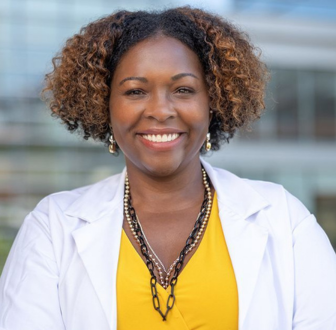
Crystal Cené, MD, is the chief administrative officer for health equity, diversity and inclusion at UC San Diego Health. She also serves as the associate chief medical officer for health equity. In this dual, complementary role, she’s focused on creating an equitable, diverse and inclusive environment for students, trainees, faculty, staff and patients.
Dr. Cené is responsible for the vision, leadership and strategic planning of UC San Diego Health’s equity, diversity and inclusion initiatives. She partners closely with leaders within the organization to ensure anti-racist, equitable, diverse and inclusive strategies, programs and policies are implemented across the health system. She brings extensive leadership, research, teaching and clinical experience to her position.
Prior to her current role, Dr. Cené was the system director for health equity and the director of the Program on Health Disparities at University of North Carolina (UNC) Health. She oversaw the health system’s 5-year strategic plan for health equity and implemented a program to reduce COVID-19 vaccine disparities. She was also responsible for planning and program implementation related to health disparities research. During her time at UNC, she was also promoted from assistant to associate professor of medicine with tenure.
She is a nationally recognized health services and health disparities researcher. Her research focuses on evaluating and implementing solutions that enhance patient and family-centered care, focusing on the disparities in care by race and socioeconomic status. Dr. Cené has authored more than 70 peer-reviewed publications and has mentored over a dozen students, trainees, and junior faculty. She has held leadership roles in national and international organizations throughout her career, including the American Heart Association, the Society of General Internal Medicine, and the Women’s Health Initiative.
Dr. Cené is a practicing general internal medicine physician. She completed her medical residency at Yale University and earned her medical degree at East Carolina University. She completed a three year clinical research fellowship and received her Master in Public Health from John Hopkins University.
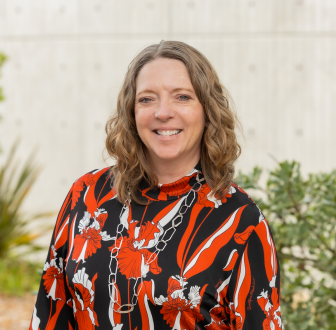
Director, Center for Empathy and Compassion Training in Medical Education
Sanford Institute for Empathy and Compassion
Lisa T. Eyler is a professor of Psychiatry at UC San Diego School of Medicine and directs the Center for Empathy and Compassion Training in Medical Education in the Sanford Institute for Empathy and Compassion. She is also a Clinical Research Psychologist in the Desert-Pacific Mental Illness Research, Education, and Clinical Center (MIRECC) at VA San Diego Healthcare System. A clinical psychologist by training, one facet of Dr. Eyler’s research focuses on cognitive, emotional, and brain aging and development across a range of populations, including community-dwelling older adults and people with schizophrenia and bipolar disorder. She has expertise in the use of cognitive assessment, structural and functional neuroimaging, blood-based biomarkers of inflammation, and mobile ecological momentary assessment for both observational and interventional studies. She has been principal investigator and co-investigator on numerous federally-funded grants, and has published over 200 scientific papers and chapters and is a member of several international research consortia. Dr. Eyler also coordinates the research efforts within the Center for Empathy and Compassion Training which include Center-led initiatives and Center-sponsored Medical Education Seed Grants. Center-led initiatives comprise studies of the impact of Institute-funded educational programs, such as Compassionatomy and the Sanford Scholars program; a longitudinal cohort study of empathy, compassion, and burnout among medical students; and, scholarship on how basic research on empathy and compassion can be used to improve applied training for health sciences students.
Dr. Eyler completed her doctoral degree at the University of Pennsylvania and came to UC San Diego as a clinical psychology intern in 1996. She became faculty at VA San Diego Healthcare in 1999 and at UC San Diego in 2000. She is active in teaching, including as co-director of a core course at the UC San Diego School of Medicine for first- and second-year medical students – Compassionate Action and Real Engagement in the Community (CARE). She is a faculty mentor in numerous research training programs for undergraduate and graduate students and post-doctoral fellows. Dr. Eyler is active in leading equity, diversity, and inclusion (EDI) efforts in Health Sciences, is the convener of the EDI Ambassadors group, and serves on the Women in Health Sciences Planning Committee. She received the 2019 UCSD Campus-wide Faculty Inclusive Excellence Award and was the 2023 UCSD Honoree at the YWCA Tribute to Women in Leadership Awards.
Professor and Chief, Division of Anatomy
Department of Surgery
UC San Diego School of Medicine
Dr. Geoffroy Noel is a Professor in the Department of Surgery at UC San Diego, and Chief of the Division of Anatomy. He teaches dissection in medical school, residency and continuing medical education programs. His research on the use of new technologies such as needle free devices, augmented reality guidance, ultrasound-guided anesthesia and 3D printing in surgical training is supported by various surgical funding agencies. His work in the field of medical education is highly cited. He recently published various articles on the history of body donation. He is currently working on novel humanistic approaches to cultivate empathy, compassion and inclusion when studying from body donors, which is sponsored by the Sanford Institute for Empathy and Compassion. He is also a 2023 Teaching + Learning Commons Changemaker Fellow for Anti-Racist Pedagogy Learning Community. His passion for teaching was recognized locally, nationally, and internationally with the 2022 and 2023, Kaiser “Excellence in Teaching” Award, the 2020 ADInstruments Sam Drogo Technology in the Classroom Award, and the 2020 Canadian Association of Medical Education Certificate of Merit.
Assistant Project Scientist
Director of Research
Center for Empathy and Compassion Training in Medical Education
Sanford Institute for Empathy and Compassion
Federica Klaus received her M.D. and Ph.D. from the University of Zurich in Switzerland and conducted her residency in psychiatry at the Psychiatric University Hospital of Zurich. She conducted a postdoctoral fellowship funded by the SNSF (Swiss National Science Foundation) and Novartis Foundation for Medical-Biological Research at UC San Diego, investigating the relationship between inflammation, brain aging, and symptoms of schizophrenia and bipolar disorder.
Her research interests include a transdiagnostic approach to biological mechanisms of serious mental illness, and how positive psychological traits, such as empathy and compassion, can increase well-being on an individual and societal level for people with and without mental disorders, reaching beyond structural barriers.
As Director of Research in the Center for Empathy and Compassion Training in Medical Education, she is in charge of collecting and analyzing data to better understand how empathy and compassion can be incorporated in medical education to increase wellbeing of clinical learners, practitioners and outcomes of patients.
Content Lead, CCT Teacher
Compassion Institute
Shireen is a family physician who has worked the majority of her career in the Northwest Territories of Canada. She first took CCT in 2014 and found it transformative for herself and her practice of medicine. She became a certified CCT teacher in 2019. Since then she has worked to bring Compassion Cultivation to health care communities. She is excited to be exploring the ways that Compassion Cultivation can support health care providers to thrive in their work.
She completed her medical degree at Queen’s University in Ontario Canada, and then obtained her training in Family Medicine in Newfoundland Canada. She also has training in emergency medicine and obstetrical ultrasound. Over her career she has provided full spectrum family practice including obstetrical care and remote medicine, and has worked in both Canada and the US. She currently lives in Calgary Alberta and continues to work as a GP Oncologist and family physician in Yellowknife NWT Canada. In her spare time she enjoys cooking and being out in nature with her husband.
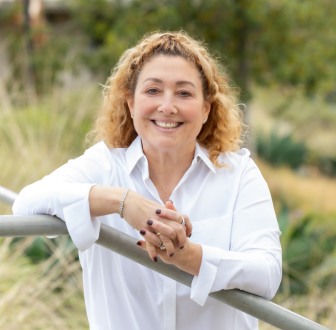
Director, Center for Compassionate Communication
Sanford Institute for Empathy and Compassion
Professor of Pediatrics
Dr. Kaplan-Liss is a national leader in communication training in medicine. Before coming to UCSD, she held the first dean-level position in a medical school, TCU and UNTHSC School of Medicine with the mission to train Empathetic Scholars®. Dr. Kaplan-Liss came to TCU from the nationally acclaimed Alan Alda Center for Communicating Science, where she was the Founding Medical Program Director and trained thousands of physicians and medical students to communicate with empathy and clarity. Her life’s work is dedicated to training healthcare providers, medical students, and researchers to communicate with compassion with their patients, colleagues from other disciplines, the community, the media, funders, benefactors, and policymakers.
As a former journalist and physician, Dr. Kaplan-Liss brings journalism and medicine to an interdisciplinary curriculum called The Compassionate Practice® that includes practices in theatre, narrative medicine, journalism, and public health. Her journalism career began when she graduated from Northwestern University’s Medill School of Journalism in 1988 and landed her first job as a researcher for Ted Koppel’s Nightline for ABC News. She left Nightline to pursue her interest in medical journalism, working as an associate producer and then segment producer on medical news for syndicated TV programs. Dr. Kaplan-Liss began her quest to combine her interests in journalism and medicine when she graduated from the Icahn School of Medicine at Mount Sinai. Dr. Kaplan-Liss did residencies in both pediatrics and preventive medicine and has a Master’s in Public Health from Columbia University’s Mailmen School of Public Health. She is board certified in pediatrics.
Evonne serves on the AAMC Fundamental Role in the Arts and Humanities in Medical Education Integration Committee, charged with setting the stage to incorporate the arts and humanities in medicine.
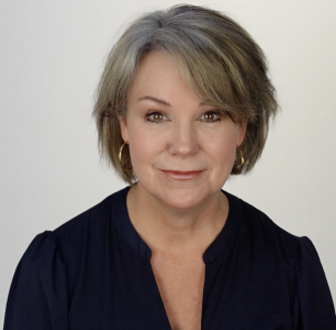
Director of Communication Education
Center for Compassionate Communication
Sanford Institute for Empathy and Compassion
Val is a professional actor, director, and teacher. She came to UCSD after serving as the Artistic Director of the TCU and UNTHSC School of Medicine. For the last decade she has created unique curricula based on theater practice and other disciplines to help healthcare providers, students and researchers connect and engage more effectively with their audiences.
As Artistic Director, she led the development of an innovative communication curriculum called The Compassionate Practice® to fulfill the mission of the school to train physicians to become Empathetic Scholars®. From 2009 to 2018, Val was the founding Improvisation Program Director at the Alan Alda Center for Communicating Science where her curriculum has been taught to over 15,000 undergrads, grad students, post-docs, faculty, senior researchers, business professionals, medical students, doctors, nurses, and Nobel Prize winners around the world.
Val’s background as an actor began with training from the prestigious University of North Carolina School of the Arts. She has worked in professional theater for 30 years, and in her spare time, Val tours Standing in my Shoes, a one-woman story about her brother’s death, to medical schools and hospitals to create conversations around empathy and resilience.
Val has worked as a consultant and mentor with business leaders, educators, and theater artists. Above all, she thinks of herself as a teacher. She loves working with students from all walks of life and helping them discover and hone their talents and their connections with themselves and their audiences.
Director, Center for Mentorship in Medicine
Sanford Institute for Empathy and Technology
Associate Director, Pediatrics Master Clinician Program
Dr. Chris Cannavino is a Pediatric Infectious Disease physician at RCHSD and an Associate Professor of Clinical Pediatrics at UCSD. After graduating from UCLA, he received his MD from the UCSD School of Medicine. Dr. Cannavino completed his Pediatric Residency at UCSD where, after serving as Chief Resident, he completed dual Fellowships in Pediatric Infectious Disease and Pediatric Hospital Medicine. He is the Director for the Center for Mentorship in Medicine at the Sanford Institute for Empathy and Compassion, Director of Pediatric Medical Student Education at the UCSD School of Medicine, Director of the UCSD Pediatric Infectious Diseases Fellowship Program, and the Associate Program Director for the UCSD Pediatric Residency Program. Dr. Cannavino has received numerous teaching awards, including the UCSD Department of Pediatrics’ "Attending of the Year Award" in 2008 & 2011, RCHSD's "Career Excellence in Teaching Award" in 2016, the Kaiser “Excellence in Teaching Award” in 2021, the "Saltman Distinguished Teaching Award” from the UCSD Academic Senate (Campus-wide) in 2021, and the Inaugural UCSD Department of Pediatrics “Excellence in Curriculum Development and Education Innovation Award” in 2023.
Associate Co-Director, Surgery Master Clinician Program
Joel Baumgartner is an Associate Professor of Surgery in the Division of Surgical Oncology at UCSD and has been the Clerkship Director for the surgery clerkship at UCSD since 2015. His practice focuses on the surgical management of peritoneal metastases and cutaneous malignancies. He conducts clinical research on the diagnosis, treatment, and surveillance of patients with peritoneal metastases and cutaneous malignancies. He also serves as a residency training course instructor for UCSD students applying into surgical residencies, a surgical shadowing preceptor for first-second year medical students, a surgical apprenticeship preceptor for a third year medical students, and instructs residents in the UCSD general surgery residency. He has been awarded the Whitehill teaching prize by the surgery residents in 2016 and 2017.

Dr. Sean Evans is a board-certified general clinical neurologist and medical educator with expertise in course design and implementation, examination content creation and assessment, and medical administration. He led UC San Diego's required clinical neurology clerkship for 12 years and co-directed the pre-clerkship level neurology core courses for 10 years. He currently has oversight for the entire UC San Diego School of Medicine curriculum from matriculation to graduation. He has worked with the National Board of Medical Examiners in development and assessment of the United States Medical Licensure Examination for the past 6 years and holds leadership roles in both material creation and assessment committees.
Associate Director, Psychiatry Master Clinician Program
Jabe Best is an inpatient psychiatrist at the VA San Diego and HS Clinical Assistant Professor of Psychiatry at UCSD. He earned MD and PhD degrees from the University of Wisconsin School of Medicine and Public Health prior to moving to San Diego to complete residency at UCSD, capped by a final year as Chief Resident. He been a lifelong runner, enjoys learning about and exploring nature, and takes coffee quite seriously. Over the years, Dr. Best has received several nods related to teaching, mentoring, and clinical efforts to include the Arnold P. Gold Foundation’s Humanism and Excellence in Teaching: Resident Award in Psychiatry (2015), Academy of Clinician Scholars Whitehill Prize for Excellence in the Teaching of Clinical Medicine (2022), and San Diego Magazine’s Top Doctors (2023).
Associate Director, Obstetrics & Gynecology Master Clinician Program
Julia Cormano is the Clerkship Director for the UC San Diego OB/GYN 3rd year medical student clerkship, and an Associate Professor of Obstetrics and Gynecology at UC San Diego Health. Her teaching awards include the CREOG Faculty Education Excellence in Resident Education Award at Mercy Hospital in Chicago (2015), the APGO Excellence in Teaching Award at Rush University Medical Center (2016), the UC San Diego Academy of Clinician Scholars, Whitehill Prize for Excellence at UC San Diego (2017), the Society for Academic Specialists in General Obstetrics and Gynecology (SASGOG) Faculty Award (2020), The UC San Diego School of Medicine MS3 Kaiser Excellence in Teaching Award (2022), and the APGO Humanism in Teaching Award (2022).
Associate Co-Director, Internal Medicine Master Clinician Program
Brian Kwan is an academic hospitalist at the VA San Diego and Professor at UCSD. He received his M.D. from Northwestern Feinberg School of Medicine and completed his Internal Medicine residency at UCSD. Dr. Kwan serves as the co-director of the Internal Medicine Clerkship at UCSD and was elected to the Clerkship Directors in Internal Medicine (CDIM) national council in 2021. He is passionate about enhancing medical education through the implementation of innovative curricula, and his research focuses on the transition between undergraduate to graduate medical education. Outside of work, Dr. Kwan enjoys outdoor hikes with his partner, coaching physicians on investing in real estate, and struggling to learn hip-hop choreography. Dr. Kwan has been recognized for his teaching excellence, receiving the Med 401 excellence in teaching award in 2012 and the IM Residency House Staff Teaching Awards in 2018 and 2019.
Associate Director, Neurology Master Clinician Program
Jamie LaBuzetta practices within the division of Neurocritical Care, and also holds administrative and education roles as a Neurocritical Care Fellowship Co-Director and Neurology Clerkship Associate Director. She has been the annual recipient of the peer selected “Most Compassionate Communicator” award within critical care for the past 3 years, and was the 2020 recipient of the Society for Critical Care Medicine’s Innovation in Education faculty award.
Associate Co-Director, Internal Medicine Master Clinician Program
Meghan Sebasky is an academic hospitalist and Clinical Professor at UC San Diego. She received her medical degree from Creighton University School of Medicine and completed internal medicine residency at the University of Minnesota where she was also a chief medical resident. Dr. Sebasky is currently the co-director of the Internal Medicine clerkship at UCSD School of Medicine. Her areas of academic interest include feedback in the clinical setting, peer rounding, and empathy, particularly as it relates to students in the clinical years of medical school. Outside of the hospital, Dr. Sebasky might be found running or perfecting the art of making an epic charcuterie board. Dr. Sebasky has been the recipient of multiple teaching awards including the Medicine 401 Excellence in Teaching award, the Internal Medicine Chiefs’ Teaching award, and the Internal Medicine Graduating Housestaff Teaching award in 2019, 2020, 2021, and 2023.
UC San Diego Pediatric Resident, prior UC San Diego Medical Student
Haley Moss is a first year Pediatric Resident at UC San Diego. She grew up in east county San Diego, completed her bachelor’s degree in computational and molecular biology at Brown University in Rhode Island, her Master’s in Public Health with a focus in global health and health disparities at the Colorado School of public health, and medical school at UC San Diego. Her research in medical school focused on teaching self-compassion to medical students and she has a growing interest in medical education. Haley is involved in the public health world and recently concluded her 3-year term as the chair of the Student Assembly for the American Public Health Association. In her free time, she enjoys taking dance classes, skiing and snowboarding, and going to concerts.
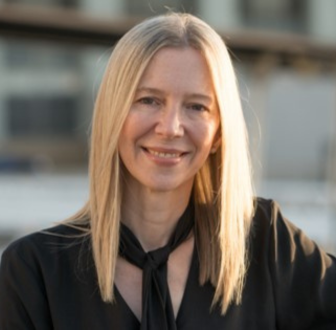
Dr. Cinnamon Bloss is an associate professor in the Department of Psychiatry and in the Division of Health Policy within the Department of Family Medicine and Public Health at UC San Diego School of Medicine. She holds a joint appointment as a policy analyst at the J. Craig Venter Institute and is a licensed clinical psychologist.
Dr. Bloss' current research focuses on the individual and societal impacts of emerging biomedical technologies. Her background is in clinical psychology, statistical genetics, genomic medicine, biomedical eithics and health policy. She has conducted both candidate-gene and genome-wide association studies of neurocognitive phenotypes, as well as empirical work on biomedical ethics topics in the areas of genetic testing, genome sequencing, and wireless sensors.
Associate Director, Training, Evaluation, and Qualitative Research, Center for Empathy and Technology
Assistant Professor, Herbert Wertheim School of Public Health and Human Longevity Science
Dr. Ramya Rajagopalan is an Assistant Professor at the Herbert Wertheim School of Public Health and Human Longevity Science. She also serves as Associate Director of Training, Evaluation, and Qualitative Research at the Center for Empathy and Technology. In that role, Dr. Rajagopalan leads curriculum development and the implementation of educational programs focused on compassionate applications of technology in healthcare delivery, including the Center’s flagship Precision Health Scholars program for health professional trainees. In her research, Dr. Rajagopalan applies empirical methods from the social and behavioral sciences to develop approaches for supporting equitable, community-centered applications of healthcare data and technologies. Her work has examined how the design and use of clinical genomics tools for testing and risk assessment can deepen racial health disparities in practice settings, promoting strategies for fostering empathy and equity in clinical implementation to advance benefits for diverse and historically underserved communities. Dr. Rajagopalan holds a PhD in genetics from MIT and completed post-doctoral fellowships at UW-Madison in Sociology and Bioethics.
Associate Director of Engagement
Prior to joining the Center for Empathy and Technology, Taylor had over 10 years of experience as a clinical genetic counselor providing prenatal, cancer, cardiology, neurology, and general adult consultations. Taylor received her master’s in Genetic Counseling and master’s in Medical Humanities and Bioethics from Northwestern University in 2011 and 2015, respectively. She also holds a master’s degree in Secondary Education from the University of Missouri-St. Louis and was a member of the Teach For America St. Louis Corps from 2009-2011. In addition to her role with our center, Taylor is also the San Diego-based Associate Director for the Augustana-Sanford Genetic Counseling Graduate Program (ASGCGP).
As the Associate Director of Engagement, Taylor leads the coordination of center events, collaborations, and outreach activities. She also develops and instructs the Precision Health Scholars program, is actively involved in select research and education projects, and contributes to Sanford Institute-wide projects and events as needed.

Director, Center for Empathy and Compassion Training in Medical Education
Sanford Institute for Empathy and Compassion
Lisa T. Eyler is a professor of Psychiatry at UC San Diego School of Medicine and directs the Center for Empathy and Compassion Training in Medical Education in the Sanford Institute for Empathy and Compassion. She is also a Clinical Research Psychologist in the Desert-Pacific Mental Illness Research, Education, and Clinical Center (MIRECC) at VA San Diego Healthcare System. A clinical psychologist by training, one facet of Dr. Eyler’s research focuses on cognitive, emotional, and brain aging and development across a range of populations, including community-dwelling older adults and people with schizophrenia and bipolar disorder. She has expertise in the use of cognitive assessment, structural and functional neuroimaging, blood-based biomarkers of inflammation, and mobile ecological momentary assessment for both observational and interventional studies. She has been principal investigator and co-investigator on numerous federally-funded grants, and has published over 200 scientific papers and chapters and is a member of several international research consortia. Dr. Eyler also coordinates the research efforts within the Center for Empathy and Compassion Training which include Center-led initiatives and Center-sponsored Medical Education Seed Grants. Center-led initiatives comprise studies of the impact of Institute-funded educational programs, such as Compassionatomy and the Sanford Scholars program; a longitudinal cohort study of empathy, compassion, and burnout among medical students; and, scholarship on how basic research on empathy and compassion can be used to improve applied training for health sciences students.
Dr. Eyler completed her doctoral degree at the University of Pennsylvania and came to UC San Diego as a clinical psychology intern in 1996. She became faculty at VA San Diego Healthcare in 1999 and at UC San Diego in 2000. She is active in teaching, including as co-director of a core course at the UC San Diego School of Medicine for first- and second-year medical students – Compassionate Action and Real Engagement in the Community (CARE). She is a faculty mentor in numerous research training programs for undergraduate and graduate students and post-doctoral fellows. Dr. Eyler is active in leading equity, diversity, and inclusion (EDI) efforts in Health Sciences, is the convener of the EDI Ambassadors group, and serves on the Women in Health Sciences Planning Committee. She received the 2019 UCSD Campus-wide Faculty Inclusive Excellence Award and was the 2023 UCSD Honoree at the YWCA Tribute to Women in Leadership Awards.
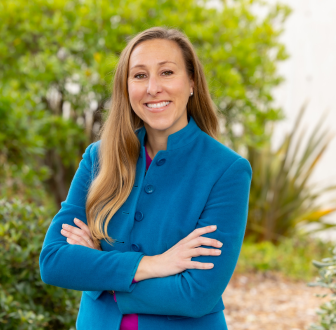
Director, Medical Education Integration
Sanford Institute for Empathy and Compassion
Jenna is an innovative administrator who has expertise in designing and implementing novel programs that meet diverse needs in complex environments. She holds a master’s degree in Applied Physiology and Biobehavioral Science from Teachers College, Columbia University, a master’s degree in Social Work from Columbia University, and is licensed as an LMSW. She received her B.A. in International Relations from the University of Southern California. Her training and life experiences drive Jenna to center equity and common humanity in her work and in her life. She is deeply committed to uplifting community voices and to building collaborative relationships to drive change.
As the Director of Medical Education Integration at the Sanford Institute, Jenna collaborates with the Institute’s six Centers to design, implement, and evaluate empathy and compassion training programs in the medical education pipeline and healthcare environments. Many of the Institute’s core initiatives are ready to be scaled to other schools of medicine and Jenna is leading the effort to build partnerships and adapt content for implementation at other institutions.
Prior to joining the Sanford Institute, Jenna served as the founder and executive director of the Achievement Initiative at the Columbia University School of Social Work. Working with the New York State Department of Education as chair of the statewide advisory board, Jenna spearheaded a shift in programming towards social-emotional learning and trauma-informed interventions for 47 projects serving more than 10,000 students annually in New York State. Jenna was an Adjunct Professor, teaching motivational interviewing to graduate social work students, and served as an Educational Coordinator, mentoring and training graduate social work students in their field practicum. She also served as the founder and co-chair of the Columbia University interdisciplinary seminar on collaborative partnerships for community youth and families. Prior to Columbia, Jenna served as the Associate Director at the Community Leadership Center at Rutgers University, Camden campus, as well as the Director of the Hunter College Liberty Partnerships Program.
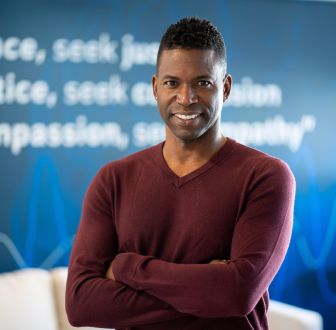
Director, Center for Empathy and Social Justice in Human Health
Sanford Institute for Empathy and Compassion
Dr. Gentry N. Patrick is the Kavli and Dr. William and Marisa Rastetter Chancellor’s Endowed Chair and Professor in Neurobiology. Dr. Patrick is a leader in the field of ubiquitin-dependent protein turnover in neurons in health and neurodegenerative disease with a particular interest in the trafficking and turnover of synaptic proteins including AMPA-type glutamate receptors. Born and raised in South Central Los Angeles, Dr. Patrick’s lived experience is a testament to the power of access, mentorship, and advocacy. His personal and professional journey into Neuroscience and academia has presented him with opportunities to leverage his own experience as an underrepresented minority student in STEM to innovate and advocate for systemic change in STEM education. In 2018, Dr. Patrick developed and launched the PATHways to STEM through Enhanced Access and Mentorship (PATHS) Program, a competitive STEM excellence scholarship program for undergraduate students from marginalized communities. Committed to diversifying the STEM and healthcare profession pipeline by building networks of support and access for under-resourced communities, Dr. Patrick has made a significant impact across the San Diego community.
He is also the inaugural Director of the Center for Empathy and Social Justice in Human Health (CESJHH) within the Sanford Institute for Empathy and Compassion at UC San Diego where he intends to leverage the power of partnership and storytelling to diversify STEM and healthcare professional spaces, effectively mitigate health disparities among marginalized communities, and explore how the intersection of empathy, compassion, and social justice can measure and catalyze systemic change for improved inclusivity and justice in human health. Dr. Patrick received his Ph.D. from Harvard University in 1999 after working in the laboratory of Dr. Li-Huei Tsai. He was a Damon Runyon Cancer Research Foundation and a United Negro College Fund/Merck postdoctoral fellow with Dr. Erin Schuman at the California Institute of Technology. Dr. Patrick joined the faculty in 2004.
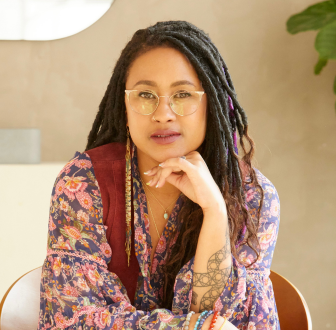
Post-Doctoral Fellow in Public Health
Center for Empathy and Social Justice in Human Health
Sanford Institute for Empathy and Compassion
Dr. Sará King is an internationally recognized neuroscientist, artist, political and learning scientist, education philosopher, social impact entrepreneur, and public speaker. She has completed her YTT-200 and YTT-300 hr. yoga teacher trainings as well as her certification as a mindfulness meditation teacher with Spirit Rock in Marin, CA. She is passionate about catalyzing humanity’s capacity to heal ourselves from the inside out and dedicated to creating accessible contemplative practices at the nexus of art, music, and meditation. She is currently a Post-Doctoral Fellow in Public Health at the T. Denny Sanford Institute for Empathy and Compassion in Human Health and Social Justice at UCSD. She is also the founder of MindHeart AI, an Ai start-up specializing in building platforms, software, and tools grounded in neuroscience, healing and well-being. She is also the author of “The Science of Social Justice” framework for research and facilitation and the inventor of the “Systems Based Awareness Map” (SBAM) - the world’s first theoretical map of human awareness - which she developed to explore our capacity to heal intergenerational trauma and promote the well-being of "collective nervous systems”. In 2021, she was named “One-To-Watch” by Mindful Magazine, as well as she made the November cover of Yoga Journal Magazine as a “Game Changer” for her work bridging neuroscience, social justice and contemplative practices. In 2022, she was also named one of the "10 Most Powerful Women in Mindfulness" by Mindful Magazine.